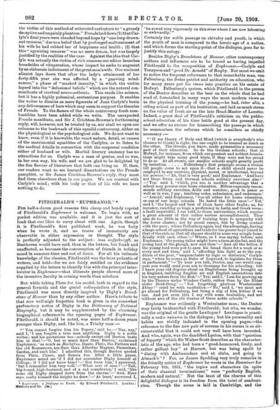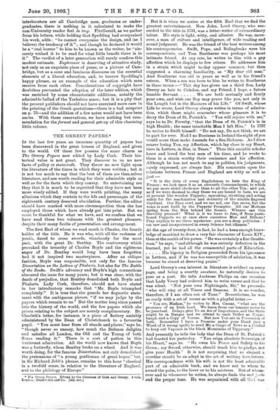FITZGERALD'S " ELPIIRANOR." *
Pon half-a-dozen good reasons this cheap and handy reprint -of FitzGerald's Euphranor is welcome. To begin with, no
pocket edition was available, and it is just the sort of book that one likes to carry about with one. Again, though it is FitzGerald's first published work, he was forty when he wrote it, and no traces of immaturity are -observable in either expression or thought. The style
is perfectly adjusted to the subject : less aufgeknOpft, as Beethoven would have said, than in the letters, but frank and
unaffected, as becomes the conversation of friends in holiday mood in summer-time and out of doors. For all his intimate knowledge of the classics, FitzGerald was the least pedantic of writers, and held—for we are fairly entitled on the evidence supplied by the letters to identify him with the.principal inter-
locutor in Euphranor—that illiterate people showed more of the inventive faculty in coining words than scholars.
But while taking Plato for his model, both in regard to the general formula and the genial colloquialism of the style, FitzGerald was more directly inspired by Digby's Broad, stone of Honour than by any other author. Hare's tribute to 'that now well-nigh forgotten book is given in the somewhat perfunctory notice of Digby in the Dictionary of National Biography, but it may be supplemented by the charming biographical reference in the opening pages of Euphranor.
FitzGerald, it should be noted, was some half-a-dozen years younger than Digby, and, like him, a Trinity man :—
You cannot forgive him his Popery,' said he.—' Nay, nay,' said I, I can forgive a true man anything. Digby is a noble writer; and his quotations too—nobody except old Burton beats him in that.'—' 0, but so much finer than Burton,' exclaimed Euphranor, as much as Eschylus, Dante, Plato, the Fathers and the old Romancers, are finer than Albertus Magnus, Paracelsus, Carden, and such like.' I admitted this, though Burton quoted from Plato, Cicero, and Seneca too. After a little pause, Euphranor asked me I did not remember Digby himself at College ; if I did not know him P Not know him,' I answered, but I remember him very well.'—' What sort of man P '—'Tall, big-boned, high-featured, and of a sad complexion,' I said, 'like some old Digby stepped down from the canvas.'' And, Hare says, really himself the knight he drew.'—' At least,' answered I,
• Elaphranor : a Die:loons on Youth. By Edward FitzGerill London : Methuen and Co. Ps.]
'he rowed very vigorously on this river where I am now labodring so awkwardly."
Certainly the noble passage on chivalry and youth, in which the youth of man is compared to the heroic age of a nation, and which forms the starting-point of the dialogue, goes far to justify this eulogy.
Besides Digby's Broadstone of Honour, other contemporary authors and influences are to be traced as having impelled FitzGerald to the composition of Euphranor,—Carlyle and Tennyson and "good Dr. Arnold" of Rugby. Nor must we omit to notice the frequent references to that remarkable man, von Fellenberg, the Swiss patriot and authority on education, who for many years put his views into practice on his estate of Hofvryl. Fellenberg's system, which FitzGerald in the person of the Doctor describes as the best on the whole that he had read of, forestalled in many ways the most modern views as to the physical training of the young,—he had, inter alia, a riding school as part of his institution, and laid as much stress on the value of fresh air as the late Head-Master of Loretto. Indeed, a great deal of FitzGerald's criticism on the public. school education of his time holds good at the present day, and we offer no excuse for transcribing the passage in which he summarises the reforms which he considers as chiefly necessary :— "If my theory of Body and Mind (which is everybody's who chooses to think) is right, the one ought to be trained as much as the other. The Greeks, you know, made gymnastics a necessary part of their education. So do the German schools ; that at Hofwyl, for instance, from which our greatest and noblest founda- tions might take many good hints, if they were not too proud to do so. At all events, our smaller schools might greatly profit
by imitation Fellenberg's first principle seems a truism till people come to act upon it—that a child should never be employed in any exercise, physical, moral, or intellectual, beyond his powers.'—' Ah, that is very good,' said Euphranor. 'And have not these Swiss and German schools military exercises also?' =Yes,' said I, 'which, you see, is another advantage that a, school may possess over home education. Milton expressly recom- mends military exercises, drills and watches ; good in peace as well as in war, I say ; teaching order, submission, and endurance.' =Arnold,' said Euphranor, was all either for home education, or one of our large schools. He hated the little ones.'—' Yet,'
said the largest and best of them have other faults; as, for instance, exacting so huge a proficiency in Latin and Greek verse; a fault imputable, I am told, to these universities, which require a great amount of that rather useless accomplishment. They also do too little in the way of training boys to sympathy with the lower classes ; not by moral essays, but by living contact with the poor; where Fellenberg again had the advantage, having a large school of agriculture and trade for the poorer boys joined to that of the rich, so that all classes should in some way mingle 'bene- ficially with each other.'—' Where, as I was saying before,' said Euphranor, the young tailor might have a turn at the bat, and the young lord at the plough, now and then.'—' And all the better, if the young lord were put to earn his bread there for a week or so every now and then,' said I, 'affording him light as to the con- dition of the poor, "unquenchable by logic or statistics," Carlyle says, "when he comes as Duke of Logwood, to legislate for them in parliament."'—' To hear you talk, Doctor, any one would sup- pose you would send your son to Germany for his schooling: but I know your old dogmas about an Englishman being brought up in England, imbibing English air and English associations into his very nature from the first.'—' Yes,' said I, 'Lam for growing up by the Thames under Windsor Castle, rather than by the Rhine under Heidelberg.' — Not forgetting glorious Westminster Abbey !' cried he with exultation.—' No,' said I, 'we must not go abroad for Fellenberg, but bring a slip of him hither if we can. And yet even this I say with some hesitation, and not without awe of the old Genius of these noble schools."
Euphranor was evidently a Westminster man; the Doctor may fairly be identified with FitzGerald; but who, we wonder, was the original of the gentle Lexilogus P Lexilogus is practi- cally a eaqi,,, r pica-roe in the dialogue ; but his personality and habits are vividly indicated in the opening pages,—the reference to the fine new pair of screens in his rooms is so cir- cumstantial that it could not very well have been invented. And. who, again, was the dandified Lycion, with that "quietism. of foppery "which Sir Walter Scott describes as the character- istic of the age, who had been a "good-humoured, lively, and rather gallant boy" at Harrow, but was being spoilt by "dining with Ambassadors and at clubs, and going to Almack's " ? For, as James Spedding very truly remarks in the friendly notice of Euphranor he wrote in the Examiner for February 8th, 1851, "the topics and characters (in spite of their classical terminations)" were "perfectly English, modern and natural" Not the least of the charms of this delightful dialogue is its freedom from the taint of academi- cism. Though the scene is laid in Cambridge, and the interlocutors are all Cambridge men, graduates or under- graduates, there is nothing in it calculated to make the non-University reader feel de trop. FitzGerald, as we gather from his letters, while holding that Spedding had overpraised his work, adds : "he cannot overpraise the design, and (as I believe) the tendency of it " ; and though he declared it would be a "real horror" to him to be known as the writer, he "sin- cerely wished it to be read for what little benefit there is in it." The verdict of a later generation will surely confirm this modest estimate. Euphranor is deserving of attentive study, not only as an exquisite piece of prose, or a picture of Cam- bridge, but as a sane and luminous discourse on the essential elements of a liberal education, and, to borrow Spedding's happy phrase, as an example of the education which men receive from each other. Considerations of copyright have doubtless prevented the adoption of the later edition, which was enriched by some characteristic additions, notably the admirable ballad of the Yorkshire mare ; but it is a pity that the present publishers should not have exercised more care in the printing of the Greek quotations—there is a bad misprint on p. 73—and the addition of a few notes would not have been amiss. With these reservations, we have nothing but com- mendation for the formal and general get-up of this charming little volume.











































 Previous page
Previous page